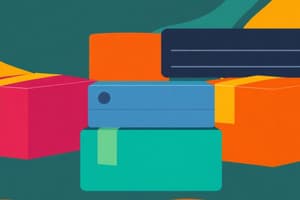Podcast
Questions and Answers
Which of the following best describes a copyleft software license?
Which of the following best describes a copyleft software license?
- It allows limited modifications to the software.
- Licenses are freely transferable without restrictions.
- It restricts the number of installations across devices.
- It permits modifications and redistribution under the same terms. (correct)
What is the primary function of spreadsheet software?
What is the primary function of spreadsheet software?
- To design visual presentations.
- To create and edit text documents.
- To manage email communications.
- To perform calculations and data analysis. (correct)
Which option accurately represents a common system requirement for software installation?
Which option accurately represents a common system requirement for software installation?
- The ability to run on any operating system.
- The need for a dedicated graphics card.
- A specific amount of memory and hard drive space. (correct)
- An active internet connection for all installations.
When upgrading software, which of the following is NOT typically a consideration?
When upgrading software, which of the following is NOT typically a consideration?
What is a crucial element of the End User License Agreement (EULA)?
What is a crucial element of the End User License Agreement (EULA)?
Which of the following functions is NOT associated with presentation software?
Which of the following functions is NOT associated with presentation software?
Which statement about software updates and patches is inaccurate?
Which statement about software updates and patches is inaccurate?
What is the role of a recovery drive in software management?
What is the role of a recovery drive in software management?
What are two basic types of software?
What are two basic types of software?
Which of the following is NOT a method of software distribution?
Which of the following is NOT a method of software distribution?
Which of these options describes commercial software accurately?
Which of these options describes commercial software accurately?
When installing software, which of the following is NOT a common consideration?
When installing software, which of the following is NOT a common consideration?
What is one of the features of app creation software?
What is one of the features of app creation software?
Which of the following best describes open source software?
Which of the following best describes open source software?
Which option is a common method for purchasing software?
Which option is a common method for purchasing software?
Which type of software is categorized under educational and reference software?
Which type of software is categorized under educational and reference software?
Application software and system software are the two basic types of ______.
Application software and system software are the two basic types of ______.
Proprietary software is also known as ______ software.
Proprietary software is also known as ______ software.
Software can be distributed through various models, including local installation and ______.
Software can be distributed through various models, including local installation and ______.
Downloading software from the Internet can be done as a purchase or a ______.
Downloading software from the Internet can be done as a purchase or a ______.
Students often benefit from ______ discounts when purchasing software.
Students often benefit from ______ discounts when purchasing software.
One consideration when upgrading software is whether the new version is ______ with existing hardware.
One consideration when upgrading software is whether the new version is ______ with existing hardware.
Digital multimedia software is used to create and edit ______ content.
Digital multimedia software is used to create and edit ______ content.
Educational and reference software is designed primarily for ______ purposes.
Educational and reference software is designed primarily for ______ purposes.
A ______ is a legal document that states the terms under which software can be used, including the number of allowed installations.
A ______ is a legal document that states the terms under which software can be used, including the number of allowed installations.
To ensure the computer can run a new application, it should meet certain ______ requirements.
To ensure the computer can run a new application, it should meet certain ______ requirements.
One of the benefits of creating a ______ is that it allows users to return their system to a previous state after an issue occurs.
One of the benefits of creating a ______ is that it allows users to return their system to a previous state after an issue occurs.
During a software ______, users can typically choose between a full installation or a custom installation.
During a software ______, users can typically choose between a full installation or a custom installation.
Recovery options include using a ______ to create a backup of a system that can be restored if needed.
Recovery options include using a ______ to create a backup of a system that can be restored if needed.
Software ______ is an ongoing process that involves installing new features and fixing bugs between major upgrades.
Software ______ is an ongoing process that involves installing new features and fixing bugs between major upgrades.
Spreadsheet software, such as ______, is designed for performing calculations and numerical analyses.
Spreadsheet software, such as ______, is designed for performing calculations and numerical analyses.
Effective ______ software should focus on clarity, using images and minimizing distractions like excessive animation.
Effective ______ software should focus on clarity, using images and minimizing distractions like excessive animation.
Flashcards are hidden until you start studying
Study Notes
Software Basics
- Software is a set of instructions that tells the computer what to do.
- There are two basic types of software: application software and system software.
Distributing Software
- Software can be proprietary (commercial) or open source (free).
- Software is distributed through local installation, Software as a Service (SaaS), and subscriptions.
Managing Your Software
- You can purchase software from a brick and mortar store or download it from the Internet.
- You can also get student discounts or use freeware.
Installing and Uninstalling Software
- Software requires system requirements to install and run.
- You can create a restore point before installing software.
- You can install all or only specific components of software.
- Uninstalling software is done through the Control Panel or Settings app.
Upgrading Software
- Software upgrades are not necessary for subscriptions or SaaS.
- You need to consider cost-effectiveness before upgrading.
Software Licenses
- The End User License Agreement (EULA) states the owner of the software, the number of copies allowed, and the number of installations allowed.
- Copyleft licenses allow users to modify and distribute software for free.
Productivity and Business Software
- Productivity software helps perform various tasks for home, school, and business.
- Popular productivity software includes Microsoft Office, Apple iWork, and LibreOffice.
- Web-based productivity software includes Microsoft Office Online, Google Docs, Zoho, and ThinkFree.
Word Processing
- Word processing software creates and edits documents.
- Examples include Microsoft Word and LibreOffice Writer.
Spreadsheet
- Spreadsheets perform calculations and numerical analyses.
- Data types include text, values and dates, formulas, and functions.
- Examples include Microsoft Excel and LibreOffice Calc.
Presentation Software
- Presentation software helps design presentations.
- Tips include using images, careful color use, bullets for key points, appropriate font sizes and styles, and minimizing animation and background audio.
Software Basics
- Software is a set of instructions that tells the computer what to do
- Two primary types of software:
- Application Software: Programs that allow users to perform specific tasks like word processing, spreadsheet calculations, or playing games
- System Software: Programs that manage the computer's hardware and resources
Distributing Software
- Proprietary (Commercial) Software is developed and sold by a company, with copyrights protecting the code, requiring purchase/licensing
- Open Source Software offers source code freely available, developers can modify and distribute it, often free but not always.
- Local Installation: Software installed directly on a device from a disk, downloaded file, or other media, providing full functionality
- Software as a Service (SaaS): Accessed over the internet, subscription-based, with data stored on servers
- Subscription: Access provided for a specific time, often monthly or annually, with updated versions included.
Purchasing Software
- Options for purchasing software include:
- Buying DVDs in physical stores
- Downloading from the internet as a purchase or with a subscription
- Student discounts offered for educational use
- Freeware: Free software offered without cost
- Beta versions: Early releases offered to test and provide feedback often free but may have issues
Installing and Uninstalling Software
- System Requirements: Minimum specifications a computer needs to run software smoothly
- Restore point: Created before installation to revert to a previous state if needed
- Full installation: Installs all components of the software.
- Custom installation: Allows choosing specific features to install.
- Recovery drive: Contains system files to restore a system to its state before a crash or issue.
- Uninstalling software removes it from the computer.
Upgrading Software
- Software upgrades (new versions) are not needed for subscriptions or SaaS, as updates are typically included.
- Consider the cost-effectiveness of upgrading versus using the current version.
- Software updates or patches address minor issues and enhance performance.
Software Licenses
- End User License Agreement (EULA): Legal agreement defining terms of use for software
- Specifies the ultimate owner of the software.
- Defines how many copies can be made.
- Limits the number of installations allowed.
- Includes warranties related to the software.
- Copyleft: A legal agreement allowing users to modify and redistribute software under specific conditions.
Productivity and Business Software
- Productivity Software helps individuals in their daily tasks at home, school, or work
- Proprietary Options: Microsoft Office, Apple iWork
- Open Source Options: LibreOffice
- Web-based Options: Microsoft Office Online, Google Docs, Zoho, ThinkFree
Word Processing Software
- Used to create, edit, and format documents like research papers, class notes, resumes
- Examples:
- Word (Microsoft)
- Writer (LibreOffice)
Spreadsheet Software
- Performs calculations, numerical analysis, and data management
- Data types used:
- Text
- Values and Dates
- Formulas
- Functions
- Examples:
- Microsoft Excel
- LibreOffice Calc
Presentation Software
- Creates slide-based presentations to illustrate ideas and communicate information
- Tips for designing effective presentations:
- Use images to enhance visuals
- Consider color choice carefully
- Employ bullets for key points
- Adjust font size and style for readability
- Minimize complex animations and background audio to avoid distractions.
Studying That Suits You
Use AI to generate personalized quizzes and flashcards to suit your learning preferences.




